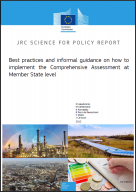Details
- Publication date
- 1 January 2015
- Author
- Joint Research Centre
Description
This report details a methodology for performing a Comprehensive Assessment identifying the most resource and cost-efficient solutions to meet heating and cooling demands for a given country or region in accordance with Energy Efficiency Directive Article 14 and Part 1 of Annex IX. More specifically the methodology guidelines include how to: (1) collect data about energy consumption and supply points needed to construct heat maps, (2) how to identify system boundaries, (3) assess the technical potential that can be satisfied by efficient technical solutions, including high efficiency cogeneration, micro-cogeneration and efficient district-heating and cooling, (4) define baseline and alternative scenarios, including quantifying the cost and benefits of both scenarios. This comprises for example the economic value of other effects is estimated, mainly, the changes in socio-economic and environmental factors. A Cost-Benefit Analyses (CBA) integrate all costs and benefits over a long period into a unique estimate, the Net Present Value, which provides information about the net change of welfare derived from the implementation of the different heating and cooling scenarios. In the end, the CBAs shall provide information about which are the most cost-efficient solutions to meet the heating and cooling needs of a country or a region.
Three best practice guidelines have been prepared by JRC on how to: (1) assess the economic energy efficiency efficient potential at the national level, (2) perform installation level assessments, and (3) create heat maps, following the requirements of the Energy Efficiency Directive (EED) Article 14.

